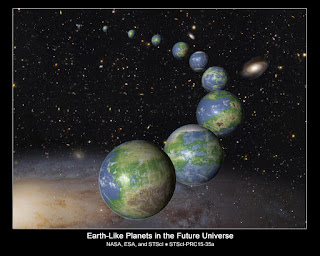Earth came early to the party in the evolving universe. According to a new theoretical study, when our solar system was born 4.6 billion years ago only eight percent of the potentially habitable planets that will ever form in the universe existed. And, the party won't be over when the sun burns out in another 6 billion years. The bulk of those planets -- 92 percent -- have yet to be born.
This conclusion is based on an assessment of data collected by NASA's Hubble Space Telescope and the prolific planet-hunting Kepler space observatory.
"Our main motivation was understanding the Earth's place in the context of the rest of the universe," said study author Peter Behroozi of the Space Telescope Science Institute (STScI) in Baltimore, Maryland, "Compared to all the planets that will ever form in the universe, the Earth is actually quite early."
Looking far away and far back in time, Hubble has given astronomers a "family album" of galaxy observations that chronicle the universe's star formation history as galaxies grew. The data show that the universe was making stars at a fast rate 10 billion years ago, but the fraction of the universe's hydrogen and helium gas that was involved was very low. Today, star birth is happening at a much slower rate than long ago, but there is so much leftover gas available that the universe will keep cooking up stars and planets for a very long time to come.
"There is enough remaining material [after the big bang] to produce even more planets in the future, in the Milky Way and beyond," added co-investigator Molly Peeples of STScI.
link.

No comments:
Post a Comment
Note: Only a member of this blog may post a comment.